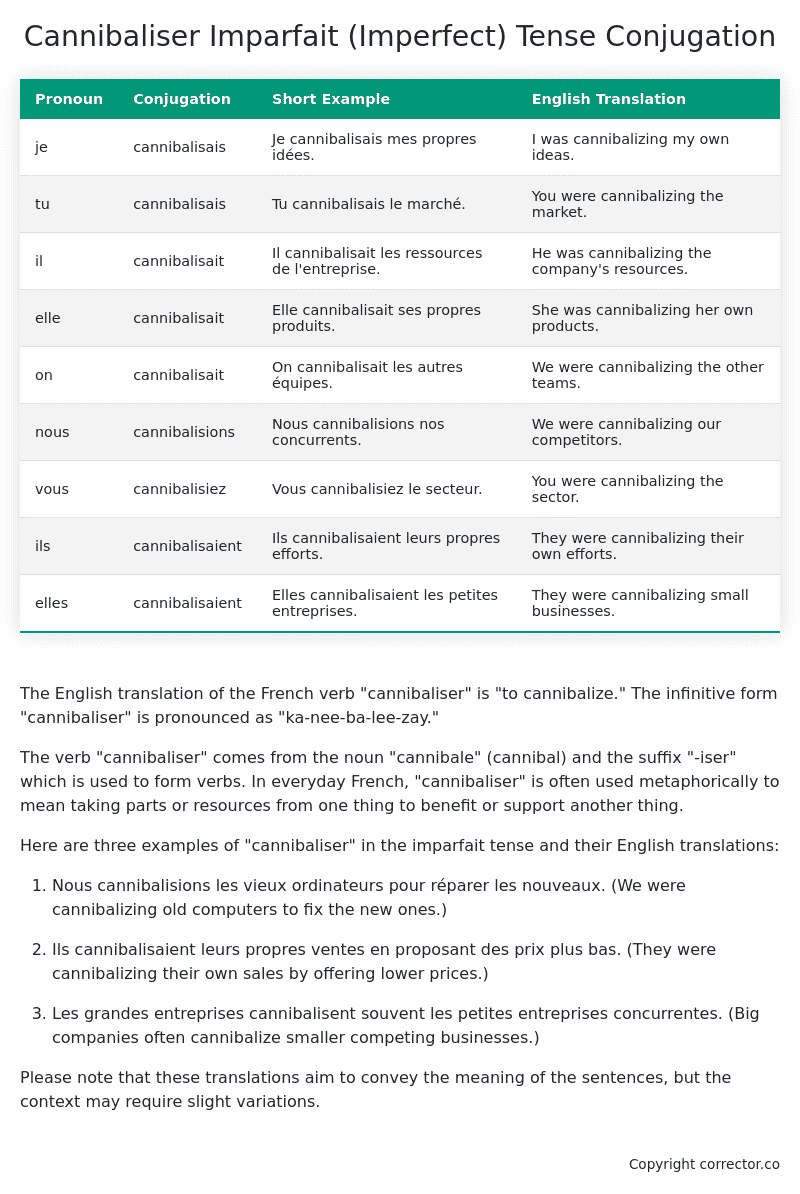Imparfait (Imperfect) Tense Conjugation of the French Verb cannibaliser
Introduction to the verb cannibaliser
The English translation of the French verb “cannibaliser” is “to cannibalize.” The infinitive form “cannibaliser” is pronounced as “ka-nee-ba-lee-zay.”
The verb “cannibaliser” comes from the noun “cannibale” (cannibal) and the suffix “-iser” which is used to form verbs. In everyday French, “cannibaliser” is often used metaphorically to mean taking parts or resources from one thing to benefit or support another thing.
Here are three examples of “cannibaliser” in the imparfait tense and their English translations:
-
Nous cannibalisions les vieux ordinateurs pour réparer les nouveaux.
(We were cannibalizing old computers to fix the new ones.) -
Ils cannibalisaient leurs propres ventes en proposant des prix plus bas.
(They were cannibalizing their own sales by offering lower prices.) -
Les grandes entreprises cannibalisent souvent les petites entreprises concurrentes.
(Big companies often cannibalize smaller competing businesses.)
Please note that these translations aim to convey the meaning of the sentences, but the context may require slight variations.
Table of the Imparfait (Imperfect) Tense Conjugation of cannibaliser
| Pronoun | Conjugation | Short Example | English Translation |
|---|---|---|---|
| je | cannibalisais | Je cannibalisais mes propres idées. | I was cannibalizing my own ideas. |
| tu | cannibalisais | Tu cannibalisais le marché. | You were cannibalizing the market. |
| il | cannibalisait | Il cannibalisait les ressources de l’entreprise. | He was cannibalizing the company’s resources. |
| elle | cannibalisait | Elle cannibalisait ses propres produits. | She was cannibalizing her own products. |
| on | cannibalisait | On cannibalisait les autres équipes. | We were cannibalizing the other teams. |
| nous | cannibalisions | Nous cannibalisions nos concurrents. | We were cannibalizing our competitors. |
| vous | cannibalisiez | Vous cannibalisiez le secteur. | You were cannibalizing the sector. |
| ils | cannibalisaient | Ils cannibalisaient leurs propres efforts. | They were cannibalizing their own efforts. |
| elles | cannibalisaient | Elles cannibalisaient les petites entreprises. | They were cannibalizing small businesses. |
Other Conjugations for Cannibaliser.
Le Present (Present Tense) Conjugation of the French Verb cannibaliser
Imparfait (Imperfect) Tense Conjugation of the French Verb cannibaliser (You’re reading it right now!)
Passé Simple (Simple Past) Tense Conjugation of the French Verb cannibaliser
Passé Composé (Present Perfect) Tense Conjugation of the French Verb cannibaliser
Futur Simple (Simple Future) Tense Conjugation of the French Verb cannibaliser
Futur Proche (Near Future) Tense Conjugation of the French Verb cannibaliser
Plus-que-parfait (Pluperfect) Tense Conjugation of the French Verb cannibaliser
Passé Antérieur (Past Anterior) Tense Conjugation of the French Verb cannibaliser
Futur Antérieur (Future Anterior) Tense Conjugation of the French Verb cannibaliser
Subjonctif Présent (Subjunctive Present) Tense Conjugation of the French Verb cannibaliser
Subjonctif Passé (Subjunctive Past) Tense Conjugation of the French Verb cannibaliser
Subjonctif Imparfait (Subjunctive Imperfect) Tense Conjugation of the French Verb cannibaliser
Conditionnel Présent (Conditional Present) Tense Conjugation of the French Verb cannibaliser
Conditionnel Passé (Conditional Past) Tense Conjugation of the French Verb cannibaliser
Conditionnel Passé II (Conditional Past II) Tense Conjugation of the French Verb cannibaliser
L’impératif Présent (Imperative Present) Tense Conjugation of the French Verb cannibaliser
L’impératif Passé (Imperative Past) Tense Conjugation of the French Verb cannibaliser
L’infinitif Présent (Infinitive Present) Tense Conjugation of the French Verb cannibaliser
L’infinitif Passé (Infinitive Past) Tense Conjugation of the French Verb cannibaliser
Le Participe Présent (Present Participle) Tense Conjugation of the French Verb cannibaliser
Le Participe Passé (Past Participle) Tense Conjugation of the French Verb cannibaliser
Struggling with French verbs or the language in general? Why not use our free French Grammar Checker – no registration required!
Get a FREE Download Study Sheet of this Conjugation 🔥
Simply right click the image below, click “save image” and get your free reference for the cannibaliser imparfait tense conjugation!

Cannibaliser – About the French Imparfait Tense
NOTE: To take a deep dive into all the French tenses then see our article on Mastering French Tense Conjugation.
Formation of the Imparfait Tense
For regular -er verbs:
For regular -ir verbs
For regular -re verbs
Common Everyday Usage Patterns
Description of Past Habits
Background Information
Mental and Emotional States
It’s employed to express emotions, thoughts, or physical sensations in the past. For example: “J’étais content quand il est arrivé.” (I was happy when he arrived.)
Ongoing Actions
Points to Note About the Imparfait Tense
Passé Composé vs. Imparfait
Conditional
Si Clauses
Narration
I hope you enjoyed this article on the verb cannibaliser. Still in a learning mood? Check out another TOTALLY random French verb imparfait conjugation!


